CO-DIRECTORS
Dr Lindsey Moore, English Literature and Creative Writing, (she/her)
 Lindsey specialises in postcolonial/world Arab literary studies: foci to date include women’s writing, nation and narration, Middle Eastern literature and cinema, and Islamist imaginaries. Her latest book is Global Arab Fiction: C21 Perspectives, co-written with Nadia Atia (Routledge, forthcoming 2024). She is primarily interested in Palestine/Israel and developing an interdisciplinary project called ‘Narrative Maps of Urban Palestine’. Lindsey was on the founding committee of the original Centre for Transcultural Writing and Research, inaugurated by Professor (Emeritus) Graham Mort; she later co-directed it with Prof. Charlotte Baker (DeLC).
Lindsey specialises in postcolonial/world Arab literary studies: foci to date include women’s writing, nation and narration, Middle Eastern literature and cinema, and Islamist imaginaries. Her latest book is Global Arab Fiction: C21 Perspectives, co-written with Nadia Atia (Routledge, forthcoming 2024). She is primarily interested in Palestine/Israel and developing an interdisciplinary project called ‘Narrative Maps of Urban Palestine’. Lindsey was on the founding committee of the original Centre for Transcultural Writing and Research, inaugurated by Professor (Emeritus) Graham Mort; she later co-directed it with Prof. Charlotte Baker (DeLC).
l.c.moore@lancaster.ac.uk
Dr Delphine Grass, Languages and Cultures, (she/her)

Delphine’s work explores creative-critical translations as world-making practices across languages, media and ecological contexts. Her recent book Translation as Creative-Critical Practice (CUP, 2023), deconstructs the boundaries between practice and theory in translation studies by analysing creative-critical translation’s theoretical engagement with translation norms, geographies and ideologies. She is also the co-editor, with Lily Robert-Foley(Montpellier III), of two collective volumes: The Translation Memoir (a special issue of Life Writing, 2024) and Unending Translation: Creative-Critical Experiments in Translation and Life Writing (UCL Press, forthcoming). She is currently conducting research on creative-critical translations which explore semiotic borders between humans and non-humans in ‘multinatural’ as well as multicultural contexts. She is a member of the interdisciplinary writing collective (D)raft.
d.grass@lancaster.ac.uk
MEMBERS
Raha Athari, English Literature and Creative Writing, (she/her)
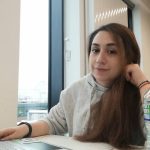 Raha is a third year PhD candidate, funded by NWCDTP AHRC. Her research focuses on contemporary autobiographical writing of Iranian women in diaspora. She examines these memoirs through the lens of memory studies and scriptotherapy. Raha is also an Associate Lecturer, with the experience of teaching in the English and Film Studies departments. She co-hosts the MENAWA (Middle East North Africa, West Asia) reading group.
Raha is a third year PhD candidate, funded by NWCDTP AHRC. Her research focuses on contemporary autobiographical writing of Iranian women in diaspora. She examines these memoirs through the lens of memory studies and scriptotherapy. Raha is also an Associate Lecturer, with the experience of teaching in the English and Film Studies departments. She co-hosts the MENAWA (Middle East North Africa, West Asia) reading group.
r.athari@lancaster.ac.uk
Dr Ele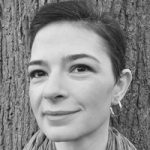 n Caldecott, English Literature and Creative Writing, (she/her)
n Caldecott, English Literature and Creative Writing, (she/her)
Elen Caldecott is a creative practitioner, now working in practice-led research on transnational themes. Her focus is fiction for young people and she explores the way that working between languages and cultures can inspire creativity, notably in her novels The Short Knife (2020) and The Blackthorn Branch (2022).
e.caldecott@lancaster.ac.uk
Dr Benjamin Dalton, Languages and Culture, (he/they)
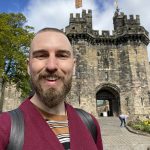 Benjamin Dalton’s current work explores dialogues across contemporary French philosophy and biomedical science. His current research project, Transforming the Hospital with Contemporary French Philosophy, examines how contemporary French thinkers can allow us to rethink and reimagine the hospitals and clinical environments of the future. His work considers how transcultural writing and thinking can participate in re-imaginings of healthcare architectures and spaces, as well as how creative writing may be used in workshops to explore what patients and clinicians think of current hospital spaces, and what they need in future provisions.
Benjamin Dalton’s current work explores dialogues across contemporary French philosophy and biomedical science. His current research project, Transforming the Hospital with Contemporary French Philosophy, examines how contemporary French thinkers can allow us to rethink and reimagine the hospitals and clinical environments of the future. His work considers how transcultural writing and thinking can participate in re-imaginings of healthcare architectures and spaces, as well as how creative writing may be used in workshops to explore what patients and clinicians think of current hospital spaces, and what they need in future provisions.
b.dalton@lancaster.ac.uk
Dr Timothy Douglas, School of Engineering, (he/him)

Timothy is a Lecturer in Bio-chemical Engineering, and interested in learning languages in the framework of a career in STEM and using language learning to promote a STEM career by (1) building more and deeper collaborations with colleagues by speaking their languages; (2) gaining appreciation of how concepts in STEM are expressed and presented in different languages, avoiding “imprisonment” in an Anglocentric view of STEM and (3) gaining access to new material not available in English and reaching audiences who do not/prefer not to speak English thanks to knowledge of other languages.
t.douglas@lancaster.ac.uk
Dr Maryam Ghorbankarimi, Lancaster Institute of Contemporary Arts, (she/her)
Maryam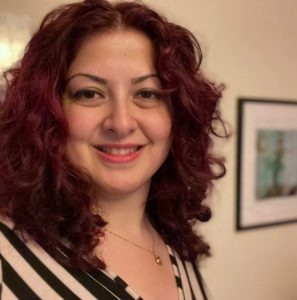 Ghorbankarimi is a filmmaker and film scholar. Her research is focused on representation women both in front of and behind the camera. Her first monograph entitled A Colourful Presence; The Evolution of Women’s Representation in Iranian Cinema (2015) was published in 2015. Her current research is on transnational cinemas and cultures, specifically the representation of gender and sexuality in Iranian cinema. Her second book, the edited volume on seminal Iranian female filmmaker Rakhshan Banietemad, ReFocus: The Works of Rakhshan Banietemad (2021) was published in spring 2021 (Edinburgh University Press). She has been working on a large scale publication on Iranian cinema with Michelle Langford and Zahra Khosroshahi, I.B. Tauris Handbook of Iranian Cinema will come out later this year.
Ghorbankarimi is a filmmaker and film scholar. Her research is focused on representation women both in front of and behind the camera. Her first monograph entitled A Colourful Presence; The Evolution of Women’s Representation in Iranian Cinema (2015) was published in 2015. Her current research is on transnational cinemas and cultures, specifically the representation of gender and sexuality in Iranian cinema. Her second book, the edited volume on seminal Iranian female filmmaker Rakhshan Banietemad, ReFocus: The Works of Rakhshan Banietemad (2021) was published in spring 2021 (Edinburgh University Press). She has been working on a large scale publication on Iranian cinema with Michelle Langford and Zahra Khosroshahi, I.B. Tauris Handbook of Iranian Cinema will come out later this year.
m.ghorbankarimi@lancaster.ac.uk
Dr Alícia Moreno Giménez, Languages and Cultures, (she/her)
 Alicia’s research centres around translation studies, verbal irony, exilic literature, Hispanic Studies, and identity and migration studies. She authored “The Translation of Irony: Examining its Translatability into Narratives” (Oxford: Peter Lang, 2022). and has delivered and published papers on the ironic short stories of the Catalan author Pere Calders within the frame of exile and trauma.. She is currently researching the use of irony in the exilic narratives of the Catalan female writer Mercè Rodoreda, and she is particularly interested in the study of peripheral identities through literature. She is editing a volume entitled Identities on the Move: An Interdisciplinary Approach to Global Displacement, which will be published by Springer in the Politics of Citizenship and Migration series in 2024.
Alicia’s research centres around translation studies, verbal irony, exilic literature, Hispanic Studies, and identity and migration studies. She authored “The Translation of Irony: Examining its Translatability into Narratives” (Oxford: Peter Lang, 2022). and has delivered and published papers on the ironic short stories of the Catalan author Pere Calders within the frame of exile and trauma.. She is currently researching the use of irony in the exilic narratives of the Catalan female writer Mercè Rodoreda, and she is particularly interested in the study of peripheral identities through literature. She is editing a volume entitled Identities on the Move: An Interdisciplinary Approach to Global Displacement, which will be published by Springer in the Politics of Citizenship and Migration series in 2024.
a.morenogimenez@lancaster.ac.uk
Dr Cornelia Gräbner, Languages and Cultures, (she/her)
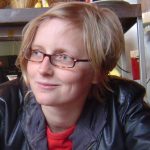 Cornelia Gräbner works on poetry-in-performance and on the social poetics of 20th and 21st politically committed writing in Europe and Latin America. She has been a part of long-term international research projects on poetry, politics and the public; has conducted research on imaginaries of acquiescence as obstacles to social and political transformation; and works on prose narratives of resistance as a process of coming-to-consciousness and of discernment. She is currently carrying out research on the genres of the poetry performance, and works with the Academic Centre for the Memory of ‘Our América’ (CAMeNA) in Mexico City to identify narratives of critical hope embedded within their archival collections, and to make poems held in the collections available to the international public.
Cornelia Gräbner works on poetry-in-performance and on the social poetics of 20th and 21st politically committed writing in Europe and Latin America. She has been a part of long-term international research projects on poetry, politics and the public; has conducted research on imaginaries of acquiescence as obstacles to social and political transformation; and works on prose narratives of resistance as a process of coming-to-consciousness and of discernment. She is currently carrying out research on the genres of the poetry performance, and works with the Academic Centre for the Memory of ‘Our América’ (CAMeNA) in Mexico City to identify narratives of critical hope embedded within their archival collections, and to make poems held in the collections available to the international public.
c.grabner@lancaster.ac.uk
Dr Tajinder Singh Hayer, English Literature and Creative Writing, (he/him)
 Taj is a scriptwriter. He works primarily in theatre and audiodrama. His writing often engages with the subjects of the South Asian diaspora in the UK, memory, place and community (often through ‘fantastic’ genres and with an interest in adaptation). His most recent work: Ghost Stories from an Old Country (an audio drama which uses the ‘English’ ghost story tradition to explore a Punjabi Sikh family’s troubled legacies); The Cyclops (a National Theatre/Cast Theatre community production that reframes the titular monster as an exploiter of labour); an as yet unreleased Big Finish audio drama that takes place in the extended Dr Who universe and explores the colonisation of India.
Taj is a scriptwriter. He works primarily in theatre and audiodrama. His writing often engages with the subjects of the South Asian diaspora in the UK, memory, place and community (often through ‘fantastic’ genres and with an interest in adaptation). His most recent work: Ghost Stories from an Old Country (an audio drama which uses the ‘English’ ghost story tradition to explore a Punjabi Sikh family’s troubled legacies); The Cyclops (a National Theatre/Cast Theatre community production that reframes the titular monster as an exploiter of labour); an as yet unreleased Big Finish audio drama that takes place in the extended Dr Who universe and explores the colonisation of India.
t.hayer@lancaster.ac.uk
Elina Mikkilä, English Literature and Creative Writing, (she/her)
 Elina’s is a creative-critical researcher specializing in transnational writer identities and pluri-linguistic practices in contemporary literature. With a background spanning Comparative Literature, Romance, Slavic, Scandinavian and Anglo-American studies across eight countries, she leverages her self-acquired multilingualism to explore how linguistically and culturally fluid experiences shape literary expression. Her research as a Marie Curie Individual Fellow focuses on decolonizing nascent discourses in the predominantly English-language tradition of Creative Writing, while integrating them into the field of Artistic Research.
Elina’s is a creative-critical researcher specializing in transnational writer identities and pluri-linguistic practices in contemporary literature. With a background spanning Comparative Literature, Romance, Slavic, Scandinavian and Anglo-American studies across eight countries, she leverages her self-acquired multilingualism to explore how linguistically and culturally fluid experiences shape literary expression. Her research as a Marie Curie Individual Fellow focuses on decolonizing nascent discourses in the predominantly English-language tradition of Creative Writing, while integrating them into the field of Artistic Research.
Sam Naseem, English Literature and Creative Writing, (she/her)
 Sam is an Associate Lecturer and PhD candidate at Lancaster University. Her research considers the representation of men and masculinity in contemporary North African fiction in English, and the impact of neopatriarchy in Egypt and Libya. Sam is currently working on the developing ‘Narrative Maps of Urban Palestine’ project, and co-hosts the MENAWA (Middle East North Africa, West Asia) reading group.
Sam is an Associate Lecturer and PhD candidate at Lancaster University. Her research considers the representation of men and masculinity in contemporary North African fiction in English, and the impact of neopatriarchy in Egypt and Libya. Sam is currently working on the developing ‘Narrative Maps of Urban Palestine’ project, and co-hosts the MENAWA (Middle East North Africa, West Asia) reading group.
s.khan35@lancaster.ac.uk
Dr Liz Oakley-Brown, English Literature and Creative Writing, (she/her)
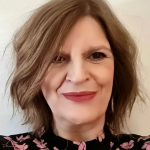 Liz Oakley-Brown’s research is underpinned by the cultural politics of translation. Her publications include the monograph Ovid and the Cultural Politics of Translation in Early Modern England (2006) and the edited collection Shakespeare and the Translation of Identity in Early Modern England (2011). With Duncan Lees (Warwick University) she is co-editing an anthology of essays Translating Shakespeare: Access and Mediation (contracted to Palgrave, 2024).
Liz Oakley-Brown’s research is underpinned by the cultural politics of translation. Her publications include the monograph Ovid and the Cultural Politics of Translation in Early Modern England (2006) and the edited collection Shakespeare and the Translation of Identity in Early Modern England (2011). With Duncan Lees (Warwick University) she is co-editing an anthology of essays Translating Shakespeare: Access and Mediation (contracted to Palgrave, 2024).
e.oakley-brown@lancaster.ac.uk
Dr Samuel O’Donoghue, Languages and Cultures,
Sam is a cultural historian and scholar of contemporary peninsular Spanish literature, with particular interests in the Franco dictatorship and the Holocaust. At the core of Sam’s research is a preoccupation with how ideas and information travel across borders and how travelling texts and concepts can influence processes of political, cultural, and social change in other national contexts. His research spans the fields of comparative literature, collective memory, analytic philosophy, and the medical humanities.
s.odonoghue1@lancaster.ac.uk
Jodie Walker, English Literature and Creative Writing, (she/her)
 Jodie is a PhD candidate in English Literature, whose focus is poetry as a form of testimony. Working with poetry from landmark events in recent British history, she argues for the representational possibilities of the form, contending that these testimonial works open up a space in which to push against a political obfuscation of events and reconstruct collective memory. Prior to postgraduate study, Jodie’s background is in Widening Participation, where she worked across schools and colleges in West Cumbria.
Jodie is a PhD candidate in English Literature, whose focus is poetry as a form of testimony. Working with poetry from landmark events in recent British history, she argues for the representational possibilities of the form, contending that these testimonial works open up a space in which to push against a political obfuscation of events and reconstruct collective memory. Prior to postgraduate study, Jodie’s background is in Widening Participation, where she worked across schools and colleges in West Cumbria.
j.walker19@lancaster.ac.uk
Dr Nicola Thomas, Languages and Cultures, (she/her)
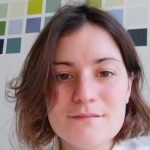 Nicola Thomas is interested in cultural ways of knowing space, place and time across geographical and linguistic boundaries, and is currently leading two British Academy funded projects which address questions of time and temporality in the Anthropocene in comparative contexts. The collaborative interdisciplinary project Wetland Times examines the multiple temporalities of wetland landscapes (Morecambe Bay, the Wadden Sea, and the Congo Basin), showing how different temporal narratives can be used to inform conservation and environmental education practices. She is also interested in and has published on the meaning of extra-terrestrial space in the context of environmental crisis.
Nicola Thomas is interested in cultural ways of knowing space, place and time across geographical and linguistic boundaries, and is currently leading two British Academy funded projects which address questions of time and temporality in the Anthropocene in comparative contexts. The collaborative interdisciplinary project Wetland Times examines the multiple temporalities of wetland landscapes (Morecambe Bay, the Wadden Sea, and the Congo Basin), showing how different temporal narratives can be used to inform conservation and environmental education practices. She is also interested in and has published on the meaning of extra-terrestrial space in the context of environmental crisis.
nicola.thomas@lancaster.ac.uk
